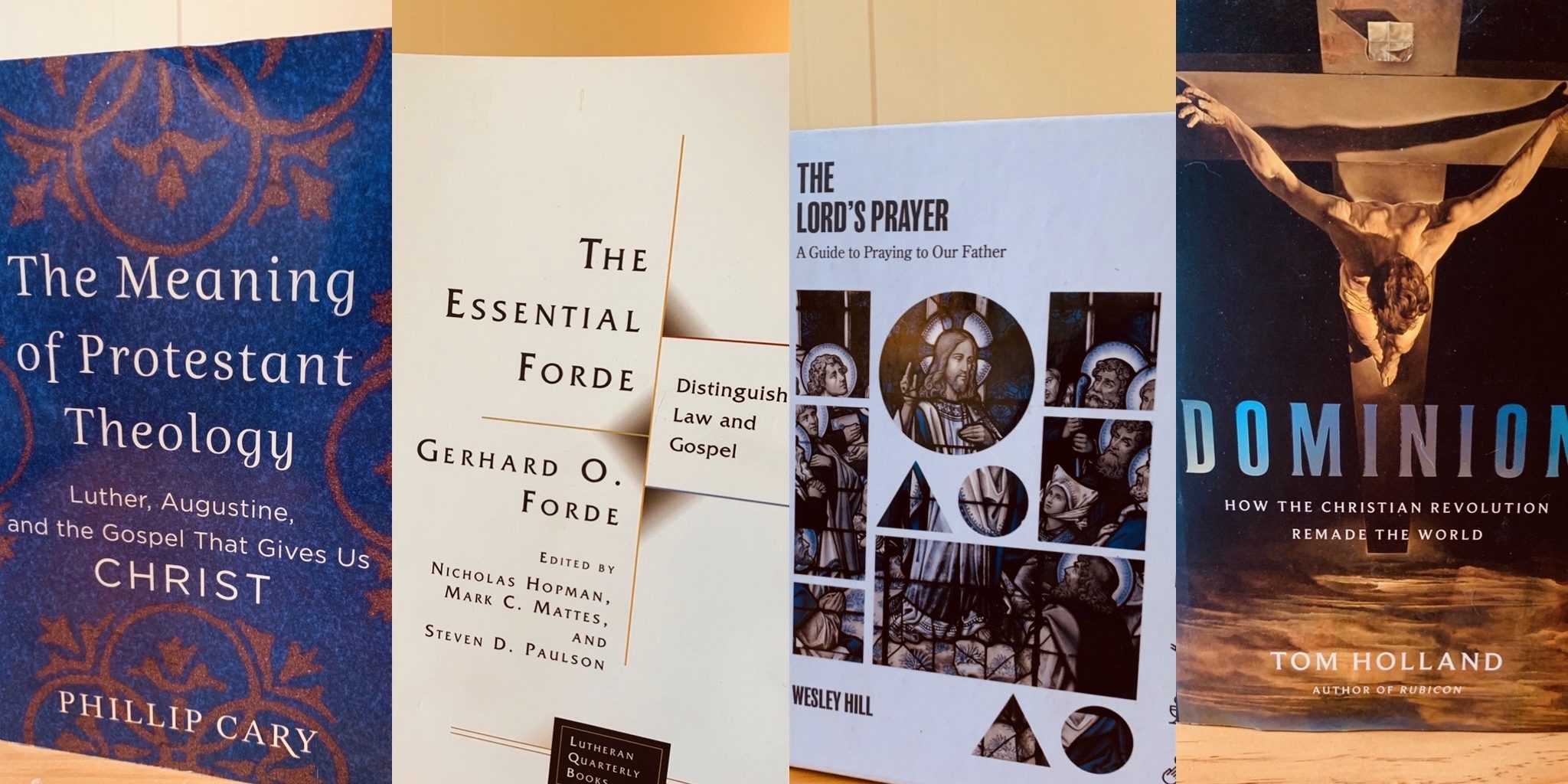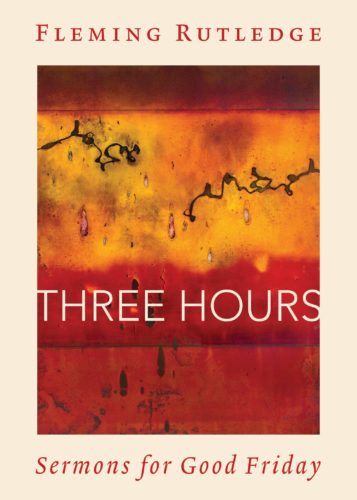
Farewell 2019! Lots to love about the books that came out this past year. Several of these are instant classics I’ll be paging through for years to come! As always, feel free to let me know in the comments if I’ve missed a deserving book! I’m always on the hunt for a good read… In no particular order:
 The Meaning of Protestant Theology: Luther, Augustine, and the Gospel That Gives Us Christ, Phillip Cary
The Meaning of Protestant Theology: Luther, Augustine, and the Gospel That Gives Us Christ, Phillip Cary
A phenomenal book that is both deeply learned and an accessible introduction to Augustine and Martin Luther. Cary outlines the key topics of their thought and the way they support the proclamation of the Gospel of Jesus Christ. While Reformed theology has frequently enlisted Augustine and Luther as its supporters, Cary shows otherwise. This book is both an indictment against Protestantism’s many theological failures and call to remember who you are and from where you came.
The Lord’s Prayer, by Wesley Hill
In these short meditations on the the petitions of the Lord’s Prayer, Hill weaves together an eclectic range of scholarship with deeply personal reflections into a tapestry that is both informative and moving. More than liturgical adornment, Jesus’ prayer takes us to the heart of who he is. It may seem short and meager, but the Lord’s Prayer audaciously asks of God for an abundance of his goodness.
The Essential Forde: Distinguishing Law and Gospel, by Gerhard Forde
A compilation of the late Gerhard Forde’s greatest hits, ranging from selections of his PhD thesis to Luther’s Heidelberg Disputation to Forde’s various theological polemics. While a couple of the essays feel out of place, the vast majority are splendid. Forde was the perhaps the best 20th century interpreter of Martin Luther and these writings explore the reformer’s most salient theme – the proper distinction between Law and Gospel.
 Three Hours: Sermons for Good Friday, by Fleming Rutledge
Three Hours: Sermons for Good Friday, by Fleming Rutledge
Rutledge follows up her earlier superb book, The Crucifixion, with a fitting coda – by preaching about the crucifixion. These sermons demonstrate the wisdom of her longer book with even more pastoral insight and heart. It’s a quick read, but worth pondering over for a quite a while.
The Emergence of Sin: The Cosmic Tyrant in Romans, by Matthew Croasmun
Paul’s apocalyptic language of the cosmic powers of sin that reign in the world is decidedly pre-modern. Few today blame the devil when the electric company turns off their power. Croasmun re-mythologizes Paul for the modern world by guiding the reader into Paul’s worldview and translates him for our scientific age. As Paul contended, we are enmeshed in a complex web of impersonal powers beyond our control. What Paul called “Sin” and “the Flesh” we might today call “the Network”, “the Algorithm”, or “the Market”, modern tyrants that enslave us perpetuate evil. The Emergence of Sin is both timely and convincing.
Dominion: How the Christian Revolution Remade the World, by Tom Holland
A while back, I read Larry Hurtado’s Destroyer of the Gods, which investigated the contrasts between early Christian beliefs and the Roman world. Hurtado explored how early Christians forged a new identity, with beliefs and practices that radically departed from their Roman counterparts. More a work of intellectual history than theology, Holland’s Dominion takes this idea and ambitiously runs with it all the way into the present day. The humble beginnings of Christianity were nothing short of a revolution for Western thought. At a time when many place the sins of modernity at the feet of Christ, Holland provocatively suggests that Zeus would have made for a far burdensome ruler. The Christian revolution indelibly changed Western history for the better to influence our supposedly secular notions of value, rights, and morality. So yea, get this book – and as a bonus maybe Holland will sign it at the NYC Conference?
Suffering and the Christian Life, ed. by Karen Kilby and Rachel Davies
This collection of essays is the most thorough theological treatment I’ve ever seen on the subject of suffering (from some of the top figures working in the field), covering St. Paul, politics, Mother Theresa, and everything in between. Together, these represent a vigorous debate about the value and significance of suffering, that universally human tragedy (or is it?). If you can stomach the price, I highly recommend it.
Paul and the Giants of Philosophy, ed. by Joseph Dodson and David Briones
These essays compare the Apostle Paul with his philosophical contemporaries. While Paul probably never stood toe-to-toe with Seneca or Aristotle, this book explores what might have happened if they did debate. I like to think of this book as a companion to Holland’s “Dominion”. It offers window into the Roman world and underscores just how radical Christianity was and continues to be.
Trains, Jesus, and Murder: The Gospel According to Johnny Cash, by Richard Beck
A wonderful book that explores the themes and theological underpinnings of Johnny Cash’s music. Cash is so beloved and venerated, I was leery of this book, but Beck definitely delivers the goods. For anyone who loves Cash this is an admirable guide into the cathedral of his lyrics that actually amplifies their power. The “Man in Black” was a more of a gospel singer than Elvis ever could be.
The Care of Souls: Cultivating a Pastor’s Heart by Harold Senkbeil
While geared toward pastors, many sections of Senkbeil’s indispensable handbook are apropos to every Christian. With heaps of warmth and wisdom, he reminds readers that our curriculum vitae is not to fix everything wrong with the world, but merely to allow the life of Christ to seep out of our hands to those in the embrace of death (i.e., everyone). Beautiful and true.
 Seculosity, by David Zahl
Seculosity, by David Zahl
You didn’t think I’d forget this one did you? “The first will be last, and the last will be first”. In this rare book that simultaneously makes you laugh and mourn at yourself, Zahl unmasks the religiously secular world we all inhabit and prescribes the balm of Gilead for our weary souls. Universally acclaimed, the world has run out of superlatives for this book. From Arminians to atheists, everyone loves this book – and for good reason! For a video introduction from the man himself, click here.
VERY Honorable Mentions:
Upside-Down Spirituality, by Chad Bird
Another hit from Mockingbird favorite, Chad Bird. Failure is never seen as a virtue, but that’s precisely what Bird contends. If God’s victory on the cross looks like defeat to the world, so it is with us. Only the losers win, which is good news for everyone.
Blessed, Broken, Given, by Glenn Packiam
A helpful guide to those looking for Jesus in the ordinary messiness of life. The hopefulness of this book captures the promise of grace. For more, see my earlier post on it!
The Reception of Jesus in the First Three Centuries, ed. by Chris Keith, Helen Bond, Christine Jacobi, and Jens Schröter
If you have the $500 to spare (ha!), this outstanding encyclopedia is the very first of its kind to ever be published. Boasting 80+ essays from many of the best scholars in the field (setting aside the “Gospel of Phillip” chapter, of course), the immediate impact of Jesus is illustrated by close study of numerous early Christian texts.

COMMENTS
One response to “The Top Theology Books of 2019”
Leave a Reply













[…] books published in 2020 that made the forever staying-at-home life a little more bearable. Click here to see last year’s […]